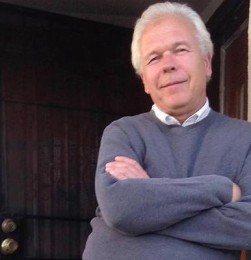Failing, Living on the Streets, and Finding Your Way Back Using Craigslist

David Raether, a former comedy writer who wrote for the sitcom Roseanne, has a terrific essay at Priceonomics about “what it’s like to fail.” In the late ’90s, Raether was making really good money: $12,000 and $15,000 per episode for a 22-episode season of a show, plus script guarantees that paid $20,000, and $650,000 a year from a television studio which paid him the large sum just to come up with ideas for television series. In 2001, he was earning about $300,000 a year, and then left the business to spend more time with his family, which he rarely got to do because he was working around the clock at the studio.
And then Raether lost everything — all his savings, his home and his family. The money disappeared while he and his wife were raising eight children. His savings was sucked dry while Raether struggled to find work after his comedy writing career ended and there were fewer jobs available because networks produced fewer sitcoms and more reality programming. He refinanced his home a few times to stay afloat, the financial crisis hit, and after four years of being unemployed, Raether’s family life deteriorated and he and his wife separated — the older children going off to college, the ones in high school moving in with friends of the family, and the youngest two moving with his wife to Germany, where she retained citizenship and where there’s a stronger social safety net.
Raether describes what it was like living on the streets:
A Saturday during my homelessness went like this.
I would wake up around 4 a.m., brush myself off, and wander around the streets for awhile until Starbucks opened. I’d spend what little money I had on coffee and hope someone left a copy of the Los Angeles Times so I could work the crossword puzzle. I’d wait. And wait. At 10 a.m., the Pasadena Central Library opens. I would walk up there and surf job websites and send off some resumes and read articles online during my allotted time until noon, or, if I was lucky, early afternoon.
That was the hard part of the day. I’d be hungry. Really hungry. A week since I had a real meal hungry. I’d walk over to Whole Foods on the Arroyo Parkway, which has good food samples on Saturdays, grab a cart, and pretend to shop. (It always helps to put some items in the cart to look the part.) The fruits are by the door — I’d grab a bunch of orange slices and watermelon chunks. Next I go upstairs to where the muffin bits and cheese chunks are and gorge as subtly as possible. I’d return the unpurchased items to their places in the store and exit.
By then it would be mid-afternoon. I’d dream of lying on a couch in a warm living room, watching college football. Instead I would walk to another public library to access the Internet. As the sun sets, I’d head to a coffeehouse in South Pasadena called Kaldi where I could find someone to talk with. It wasn’t the company of loved ones, but they were decent people who didn’t ask too many questions about my circumstances.
Night. At 8 p.m. I’d return to the Starbucks. I would find discarded copies of the New York Times and start working the crossword puzzle. And that was Saturday.
Raether was able to get himself off the streets by finding odd jobs on Craigslist, which he applied for using the internet at the library. “People say you can find just about anything you need on Craigslist,” Raether writes. “You might even find your life again.”
Support The Billfold
The Billfold continues to exist thanks to support from our readers. Help us continue to do our work by making a monthly pledge on Patreon or a one-time-only contribution through PayPal.
Comments